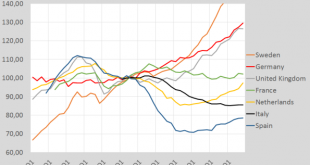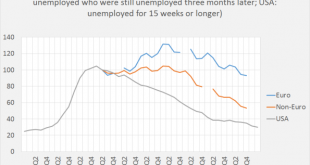House price developments in the EU show large differences in development – which makes the task for monetary and fiscal policy even more difficult. One of the beneficial consequences of the Great Financial Crisis is that economic statisticians at for instance Eurostat or the Bank for International Settlements spend more effort on assembling house prices , though The Economist deserves praise as it led the way about 15 years ago. What do these data tell us? Low interest rates are...
Read More »The nature of growth: three visions
Do we need growth? Do we need technology? Is technology ‘neutral’ in the sense that its appearance and use can be understood without historical context? The Journal of Industrial Ecology has a special issue about such ideas. I love the kind of calculations they do about flows of stuff. But Vincent Moreau, Marlyne Sahakian, Pascal van Griethuysen and Francois Vuille have an apt observation. In light of the environmental consequences of linear production and consumption processes, the...
Read More »What Macron should know about the win-win-win-win-win consequences of the new German minimum wage
Recently, Germany introduced an economy wide minimum wage. This led to better jobs, better incomes, an increase in productivity, no upsurge in inflation and no decline of employment growth: “Higher wages, shorter hours The comparison of both worker groups shows that the minimum wage has worked. As intended, the hourly wage of the interviewed minimum wage workers rose from €6.70 to €8.20, an impressive 22 percent. This is a multiple of the wage increase in the control group, which amounted...
Read More »Involuntary unemployment in the Eurozone, the rest of the EU and the USA: elevated and high
In the USA and the EU, employment is up and unemployment is down. But unemployment is not yet low. Unemployment rates have to decline more (a bit in the USA, a lot in the EU) and participation rates have to recover (a lot in the USA, a bit in the EU). In the EU, there are large differences between countries (compare Spain with Germany). But on the macro level, there is still a large reservoir of involuntary unemployment and, looking at the participation rates, people who have given up...
Read More »Trumpcare Would Make U.S. Healthcare Even More Dysfunctional
Dean Baker, Co-Director of the Center for Economic and Policy, discusses the fight over Trumpcare and the problems with the existing healthcare system that the GOP wants to gut even further Visit http://therealnews.com for more stories and help support our work by donating at http://therealnews.com/donate.
Read More »Economics 10Whatever
from Peter Radford I have been less vexed about economics recently precisely because I have been focused on other, and more urgent, topics. The politics of our age are wondrously absorbing, if not a little disturbing. In any case I do try to keep an eye on what economists are up to. In that endeavor I came across a short article by Diane Coyle on the website “Project Syndicate”. If you want to know what is occupying the establishment it’s a good place to visit periodically. And Professor...
Read More »This is the end—or is it?
from David Ruccio Obviously, recent events—such as Brexit, Donald Trump’s presidency, and the rise of Bernie Sanders and Jeremy Corbyn—have surprised many experts and shaken up the existing common sense. Some have therefore begun to make the case that an era has come to an end. The problem, of course, is while the old may be dying, it’s not all clear the new can be born. And, as Antonio Gramsci warned during the previous world-shaking crisis, “in this interregnum morbid phenomena of the...
Read More »new issue of Real-World Economics Review
real-world economics reviewIssue no. 80 download whole issue Inequality, democracy and the ecosystem Politics, preferences, and prices: the political consequences of inequality 2Luke Petach download pdf The triumph of Pareto 14Gary Flomenhoft download pdf Do we need a new economics for sustainable development? 32Peter Söderbaum download pdf From green growth towards a sustainable real economy 45Jørgen Nørgård and Jin Xue...
Read More »Dean Baker memorial
Amazing Grace
Read More »Mainstream monetary theory — neat, plausible, and utterly wrong
from Lars Syll In modern times legal currencies are totally based on fiat. Currencies no longer have intrinsic value (as gold and silver). What gives them value is basically the legal status given to them by government and the simple fact that you have to pay your taxes with them. That also enables governments to run a kind of monopoly business where it never can run out of money. Hence spending becomes the prime mover and taxing and borrowing is degraded to following acts. If we have a...
Read More » Real-World Economics Review
Real-World Economics Review





